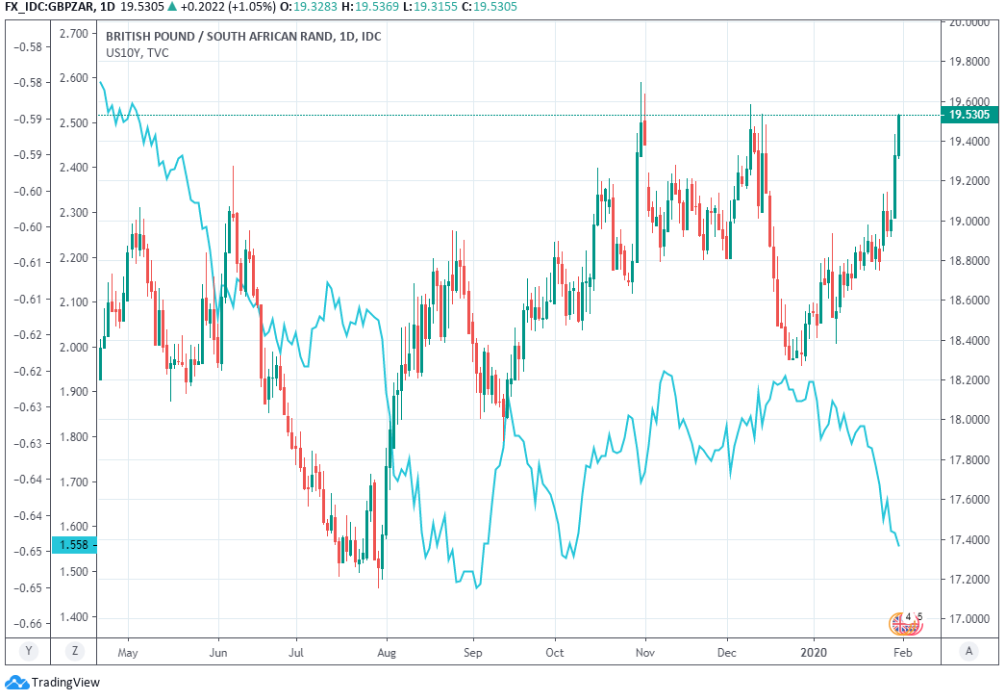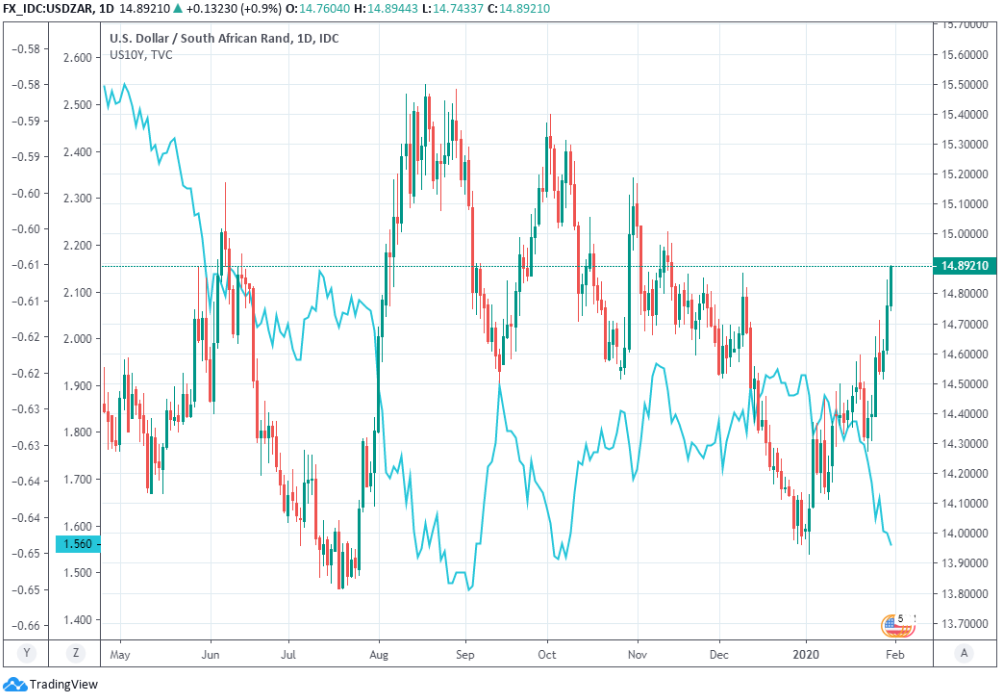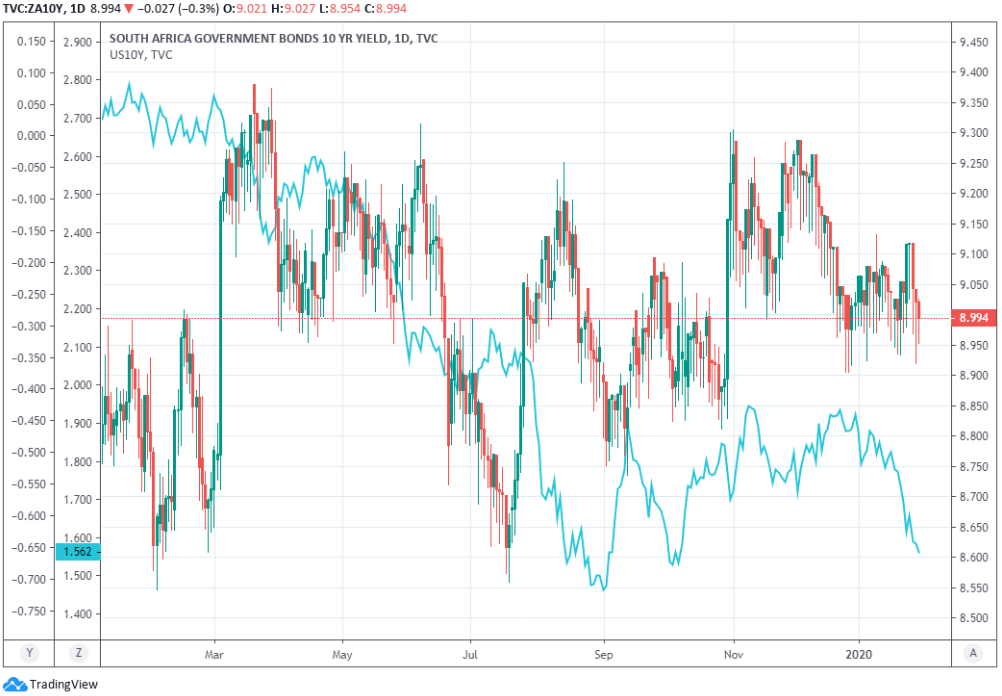South African Rand Has Further to Fall on Eskom Woes and Toxic Global Environment
- Written by: James Skinner
- ZAR down Vs GBP and USD but faces more losses.
- Eskom on stage 2 load-shedding again from Friday.
- Hints at long-term need for public cash over debt bill.
- Says power cuts to increase, along with debt interest.

Image © Eskom SOC
- GBP/ZAR Spot Rate: 19.47, up 0.93% today
- Indicative bank rates for transfers: 18.81-18.95
- Indicative broker rates for transfers: 19.20-19.32 >> find out more about this rate.
The Rand traded lower on Friday owing to a mix of domestic concerns about Eskom as well as international fears over the rapidly spreading coronavirus from China and with neither ailment likely to ease any time soon, some analysts say the South African currency is poised for more losses.
South Africa's Rand ceded ground to the Pound and Dollar in the final session of the week after the ailing power utility Eskom said it would resume stage 2 load-shedding from 09:00 Friday, draining 2,000Mw of power from a national grid that's long been creaky due to years of mismanagement and under-investment.
The announcement was made without humour just hours before new CEO Andrew de Ruyter delivered his maiden State of the System update.
— Eskom Hld SOC Ltd (@Eskom_SA) January 31, 2020
CEO de Ruyter said Friday that power cuts could increase over the "medium-term" as Eskom takes on maintenance jobs that have gone unattended to for too long, which is bad news for the struggling South African economy. Although the newly-installed chief also hinted that Eskom could soon need further cash from the government. He's expected to right a capsized ship and in the process, reduce the risk posed to the public purse by Eskom's overly-stretched and government-guaranteed balance sheet.
"Perhaps we should be asking for a daily load-shedding forecast alongside the weather forecast?" says Siobhan Redford, an economist at Rand Merchant Bank. "The rand is likely to remain under pressure as risk-off trade continues to dominate global market movements. Let us hope that February 2020 – beginning tomorrow – brings positive news both in terms of the coronavirus, but also for SA as we can look forward to the month that will bring us both the State of the National Address (14 February) and the South African Budget (26)."
de Ruyter said Friday that Eskom's interest bill is set to increase over the coming years as it seeks to refinance, rather than simply repay, existing debts on its balance sheet. The rub for the Rand is that Eskom already struggles to pay its existing interest bill and has gone cap-in-hand to the government for cash handouts at least twice over in the last two years as a result.

Above: Pound-to-Rand rate at daily intervals, rising as 10-year U.S. Gov bond yield falls in 'risk-off' global market.
Eskom is the single largest threat to South Africa's investment grade credit rating at Moody's, which will be reviewed around the beginning of March and is increasingly expected by the market to be downgraded to 'junk' - potentially triggering large outflows of capital from South Africa and more pressure on the Rand. Moody's has warned that a credible plan for righting Eskom is necessary to preserve the rating, although the government is yet to produce anything concrete, much less make progress.
"The coronavirus (2019-nCoV), which has been declared a public health emergency of international concern, is driving most of the [movement]. This is overshadowing some of the positive developments," says Annabel Bishop, chief economist at Investec. "Should the impact of the 2019-nCoV prove to be more severe than markets anticipate (which is currently likely an expectation of a limitation of the spread by February and widespread vaccination and treatment before the middle of the year) EM currency weakness and US dollar strength is likely. 2020 looks like it could be a volatile year."
Concerns are mounting over Eskom as markets become increasingly attuned to the threat posed by China's new pneumonia-like coronavirus, which has spread to at least 20 other countries leading the World Health Organization to declare a global emergency on Thursday. The virus has threatened to bring China's economy to a near-standstill this last week and was confirmed to have reached the UK on Friday, with two intrafamily cases reported.
"ZAR slid further into turmoil today, losing 1.37% against the USD, 1.6% against the euro and 1.76% to the pound. With limited data released during the day, the weakness is attributed to the continued selloff of emerging market assets as panic surrounding the coronavirus continues to grip markets, resulting in a flight from riskier assets, following the WHO declaring the virus outbreak a global health emergency," says Bianco Botes, treasury partner at Peregrine Treasury Solutions. "The rand is currently trading at R14.95/$, R16.54/€ and R19.64/£."

Above: USD/ZAR rate at daily intervals, rising as 10-year U.S. Gov bond yield falls in 'risk-off' global market.
"The Emerging Market currency space has stumbled badly on the outbreak of the coronavirus in China, which has impacted risk appetite, but many select commodities even more so since the story picked up attention in the market," says John J Hardy, head of FX strategy at Saxo Bank. "We really don’t know where this situation will take us, but the issue is the most important one in the driver’s seat until it is firmly behind us."
Chinese cities are turning to ghost towns as the public isolate themselves to avoid infection. That explains in large part why a government economist said on Wednesday that GDP growth could fall below 5% this quarter, from 6% previously - a slowdown that'd likely be felt far beyond China's borders.
That's especially bad news for South Africa's economy, which was already at risk of a three-quarter recession, because its largest trading partner and foreign direct investor is China.
The Dollar was higher against most of its rivals after benefitting from market unease over the international spread of the virus, which is almost always bad news for emerging market currencies but especially the troubled Rand.
"The market is proving slow to recognize the risks of a dramatic downgrade to global growth this year as a consequence of the coronavirus outbreak and its effects on global supply chains and consumer activity, even as well all hope for a minimum toll on human life," says Steen Jakobsen, chief economist at Saxo Bank. "Expect significant repricing of short-term policy rates (read: the Fed) down to protect yield curve steepness. By the end of February, as much as 100 basis points lower global growth should be fully priced and companies will submit much lower guidance on this disruption (Apple started yesterday)."

Above: South African 10-year government bond yield alongside the U.S. 10 -yr that's also the global 'risk-free' rate.




